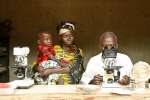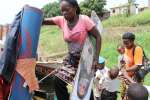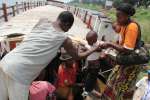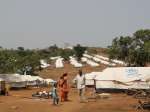- Text size
 |
|  |
|  |
| 
- Français
Seeking peace, Central African refugees turn out to vote
News Stories, 31 December 2015
GADO BADZERE, Cameroon, Dec 31 (UNHCR) – Hawas was driven into exile from the Central African Republic (CAR) by violence. But determined to play a part in shaping her troubled country's future, she was among thousands of refugees who turned out to vote in absentia in presidential elections
"These elections bring hope for us because a new elected president could help restore peace and security," said Hawa, 32, who turned out to vote at a polling station set up in a school at the Gado Badzere refugee site in Cameroon on Wednesday (December 30).
More than 470,000 people have fled fighting in recent years in Central African Republic and sought safety in neighbouring Cameroon, Chad, the Republic of Congo, or ROC, and the Democratic Republic of the Congo. This includes some 220,000 who have fled since rebel groups overthrew then President Francois Bozize in 2013.
Some 115,151 refugees were eligible to vote in the election, nearly half of whom were registered to vote by the Electoral Commission. As well as those who cast votes in Cameroon, 3,742 refugees voted in ROC, 1,648 of them at Betou and Ikpembele, the main refugee hosting areas near the CAR border.
Voters were able to choose among more than two dozen candidates for president in an election that has been pushed back several times. The December 30 poll went ahead after a three-day postponement to allow officials deal with technical and organizational difficulties.
A bustle of activity much like a busy market prevailed at the polling centre in Gada Badzere. Many of those who voted said that they saw it as an opportunity for restoring peace and security in their country, regarded as a necessary condition for their safe return.
"For me the person who will be elected president doesn't matter. The most important is the return of peace," said Bouba, 50, a refugee who heads the Vigilante Committee, which helps keep order at Gado Badzere.
Some casting their votes in exile also hoped that the next president would be able to address other issues, among them providing compensation for property lost in the conflict, including houses and cattle.
"It's not only matter of return," said Bouba, who voted in the election. "But what shall we do over there? Where shall we go? All our properties were looted and plundered".
UNHCR's role in the election, in which parliamentary representatives were also up for selection, was strictly humanitarian and non-political. The agency informed refugees about the electoral process, facilitated their participation and helped ensure the voluntary nature of the electoral process in a safe environment.
When checking the electoral roles to vote, some refugees found they were not on a list drawn up by the Nation Election Authority, a CAR organization in charge of elections. However, all refugees eligible to do so were allowed to vote. Despite these relatively minor setbacks, the fact that thousands of succeeded in voting was seen as a success.
"Overall this election is important for refugees as they feel it as a sign of renewal, a sign of reconciliation in CAR. Refugees were ready to vote, they got mobilized very early in the morning to be able to vote" said Fode Baba Conde, a Field Coordinator for the UN Refugee Agency, UNHCR, in Cameroon.
By Djerassem Mbaiorem in Gado Badzere, Cameroon.
Additional reporting by Andreas Kirchhof in Kinshasa, Democratic Republic of Congo














































